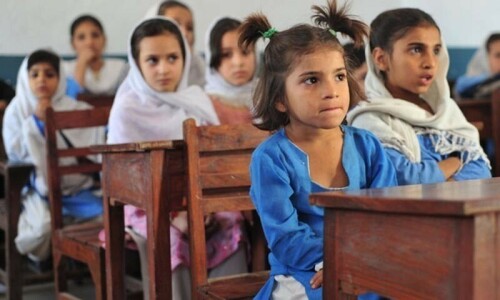ISLAMABAD: Democracy will remain elusive until all institutions agree to work within the parameters of the Constitution and abide by the principle of the trichotomy of powers, PPP Senator Farhatullah Babar said on Wednesday.
Mr Babar was speaking at a seminar on ‘Role of Institutions in Strengthening Democratic Dispensation’, organised by the Sustainable Development Policy Institute (SDPI).
Mr Babar also called for across the board accountability for all strata of society and reversal of the tendency to exercise power without responsibility.
Broader dialogue among state institutions needed to strengthen democratic dispensation, politicians say
He said that some find it easy to lay blame on parliament alone, but parliament can only make laws and the interpretation and implementation of law is not its responsibility.
Like other speakers, Mr Babar supported the proposed dialogue and said that dialogue should be held in parliament.
Other speakers also agreed that a broader dialogue among state institutions was imperative to sustain and strengthen democratic dispensation.
The seminar was organised after debate that began in response to a recent statement by Senate Chairman Raza Rabbani, who called for inter-institutional dialogue to pull the country out of its prevailing crisis and tackle ongoing issues.
Representatives from various political parties, other than the PML-N, participated in the moot and discussed the role of state institutions.
PPP leader and former Senate chairman Syed Nayyar Hussain Bokhari said a functional democracy could not be established until the people themselves come forward and stand behind the Constitution.
He added that there has been some talk about amending articles 62 and 63, but the right time for a constitutional amendment will be after the next general election. “The amendment should not be person specific,” he said.
Mr Bokhari said it was military dictator Ziaul Haq who had inserted controversial articles into the Constitution. Senior journalist M. Ziauddin said the country is facing a transitional period, which is a vulnerable period. He said without the military’s participation, the dialogue process would have no outcome.
Awami National Party leader Afrasiab Khattak said Pakistan’s civilian governments have always been undermined by the real powerful rules. He said there was much ado about corruption, but corruption was a result of martial law regimes. He added: “I do agree that dialogue is the only way to resolve all issues.”
Shafqat Mehmood, a Pakistan Tehreek-i-Insaf lawmaker, said it was unfortunate that corruption was being hidden in the name of democracy. He said national institutions need to be given autonomy not only at the highest level but at every level, including the police and other state functionaries, to strengthen democracy.
Mr Mehmood said military dictators had destroyed institutions, including the judiciary and the parliament, and had created subservient parliaments, “but we cannot absolve politicians for weakening democratic institutions further”.
Senator Barrister Mohammad Ali Saif of the Muttahida Qaumi Movement said that while institutions evolve gradually, we must understand that reclaiming democratic rights to establish a real democracy is a painstaking process and thus, a change in behaviour would play a crucial role in this discourse.
Earlier, SDPI Executive Director Abid Qaiyum Suleri said the need for a national dialogue on democratic dispensation was important because the gap between state institutions could be sensed at all levels, particularly by the public.
Senior journalist Mattiullah Jan said it seemed that when parliamentarians and political parties call for dialogue it indicates that they have failed to run the country efficiently. He said it was time for all institutions to assume their rules as per the dictates of the Constitution.
Rana Qaiser was of the view that parliamentarians’ failure to strengthen the institution had led to the present state of affairs, while television anchor Asma Shirazi said civilian authorities should think about restoring their credibility, which was eroded constantly.
Published in Dawn, August 24th, 2017















































Dear visitor, the comments section is undergoing an overhaul and will return soon.